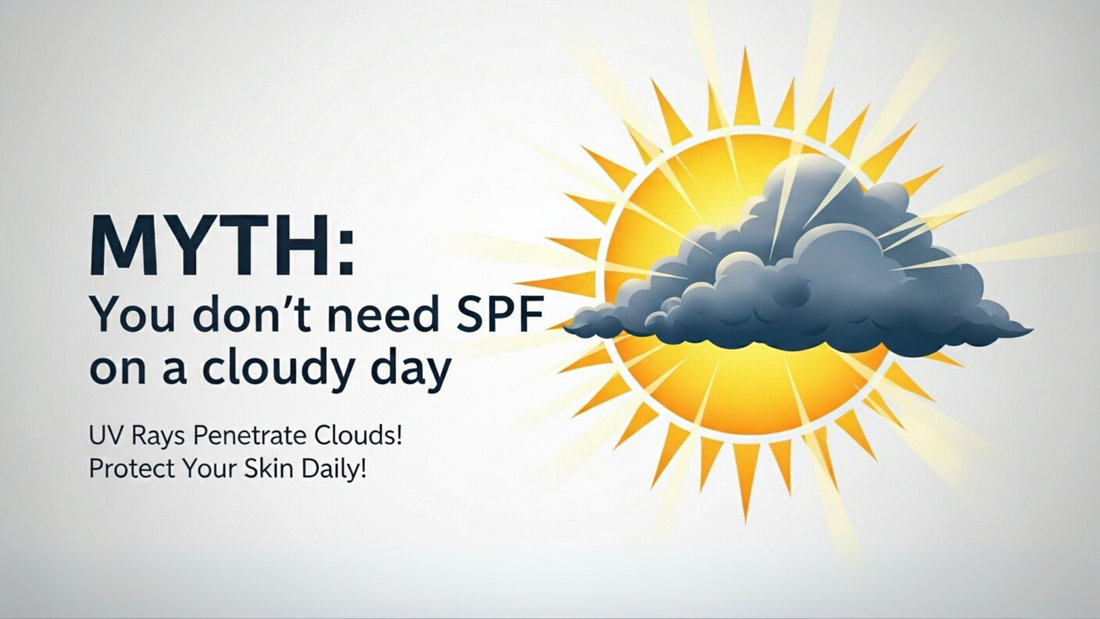
Share
Do you need sunscreen on cloudy days? — Why You Should Always Wear Sunscreen
How UV rays behave on cloudy days
UVA vs UVB: the basics
UVA reaches deeper into skin and causes aging. UVB sits more on the surface and causes sunburn. Both raise skin cancer risk. That is why sunscreen matters for both daily wear and long-term skin health.
Clouds, scattering, and UV penetration
Clouds scatter sunlight, turning bright beams into diffuse light. Diffuse light still carries UVA and UVB. Thin or broken clouds let through a lot of UV. Even on overcast days, enough UV can reach and harm your skin.
Real-world evidence
You’ve likely seen sunburn at an overcast beach or after a cloudy hike. Studies show measurable UV exposure on cloudy days. Outdoor workers often get significant UV doses on cloudy days. This proves the risk is real.
Do you need sunscreen on cloudy days?
Prevent photoaging and hyperpigmentation
UV exposure is cumulative. Small doses build up and show as fine lines, sagging, and dark spots. A consistent Daily SPF skincare habit slows that damage. Sunscreen is your best daily anti-aging step.
Reduce skin cancer risk
Sunscreen lowers UV-driven DNA damage. Regular use reduces the risk of some skin cancers. That’s a strong health reason to keep sunscreen on your morning checklist.
Who is at higher risk
Fair skin burns faster and is more vulnerable. Certain medications make skin more UV-sensitive. Pregnancy can increase hyperpigmentation risk. People who work outdoors face repeated exposure. If any of these apply, sunscreen is vital.
Choosing the right product: SPF and protection
How much SPF do you need? (SPF for daily use)
Choose SPF 30 or higher for most people. SPF 30 blocks about 97% of UVB, and SPF 50 blocks about 98%. For high sun, long outdoor time, or very fair skin, consider higher SPFs. For daily errands and cloudy days, SPF for daily use of 30 is a smart baseline.
Broad-spectrum and ingredient tips
Broad-spectrum sunscreens protect against UVA and UVB. Look for filters like avobenzone, zinc oxide, or mexoryl in labels. Mineral filters tend to be gentle and good for sensitive skin. Chemical filters can be lightweight and cosmetically pleasant. Choose what you’ll use every day.
Sunscreen for face and body: textures and trade-offs
Textures matter for habit. Lotions spread easily for large areas. Gels feel light and work well for oily skin. Sticks are great for ears and around the eyes. Sprays are convenient for body reapplication but use enough product. Pick a sunscreen for face and body you enjoy using.
A simple daily sunscreen routine (daily sunscreen routine morning skincare)
Order of application
Cleanse your face first. Apply serums next. Follow with moisturizer if needed. Finish with sunscreen. Give sunscreen 1–2 minutes to absorb before makeup. This order keeps protection effective and makeup smooth.
Makeup, primers, and SPF layering
Many tinted moisturizers and makeup products contain SPF. They offer some protection but usually not enough for full-day needs. If your makeup has SPF, treat it as a backup. Apply a dedicated sunscreen first, then makeup. For extra coverage use a sunscreen primer or a setting product with SPF.
Common myths and mistakes to avoid
Myth: Clouds block harmful rays
Clouds reduce visible brightness but not all UV. Thin clouds can even increase UV in some conditions. Don’t skip sunscreen because you can’t feel the sun. That’s a common and risky mistake.
Practical tips to make Daily SPF skincare easy
Pick a texture you actually like
A sunscreen you enjoy using becomes a habit. If you like tinted products, choose a tinted SPF. If you have oily skin, try a gel or mattifying formula. If you travel light, a stick might be best. The right texture makes daily use simple.
How Raafiaura can help
Raafiaura blends natural and science-backed ingredients for everyday use. We offer options for face and body that are gentle and effective. Affordable pricing and pleasant textures make sticking to a daily sunscreen routine morning skincare easier.
Conclusion
Yes — always wear sunscreen, even on cloudy days. Clouds do not stop all UV, and daily exposure adds up. Choose SPF for daily use of at least 30. Build a simple daily sunscreen routine morning skincare that fits your life. Start small, pick a sunscreen you like, and make it part of your day.
Check out Raafiaura for affordable, proven products that support healthy, glowing skin. Shop Now with @Raafiaura
